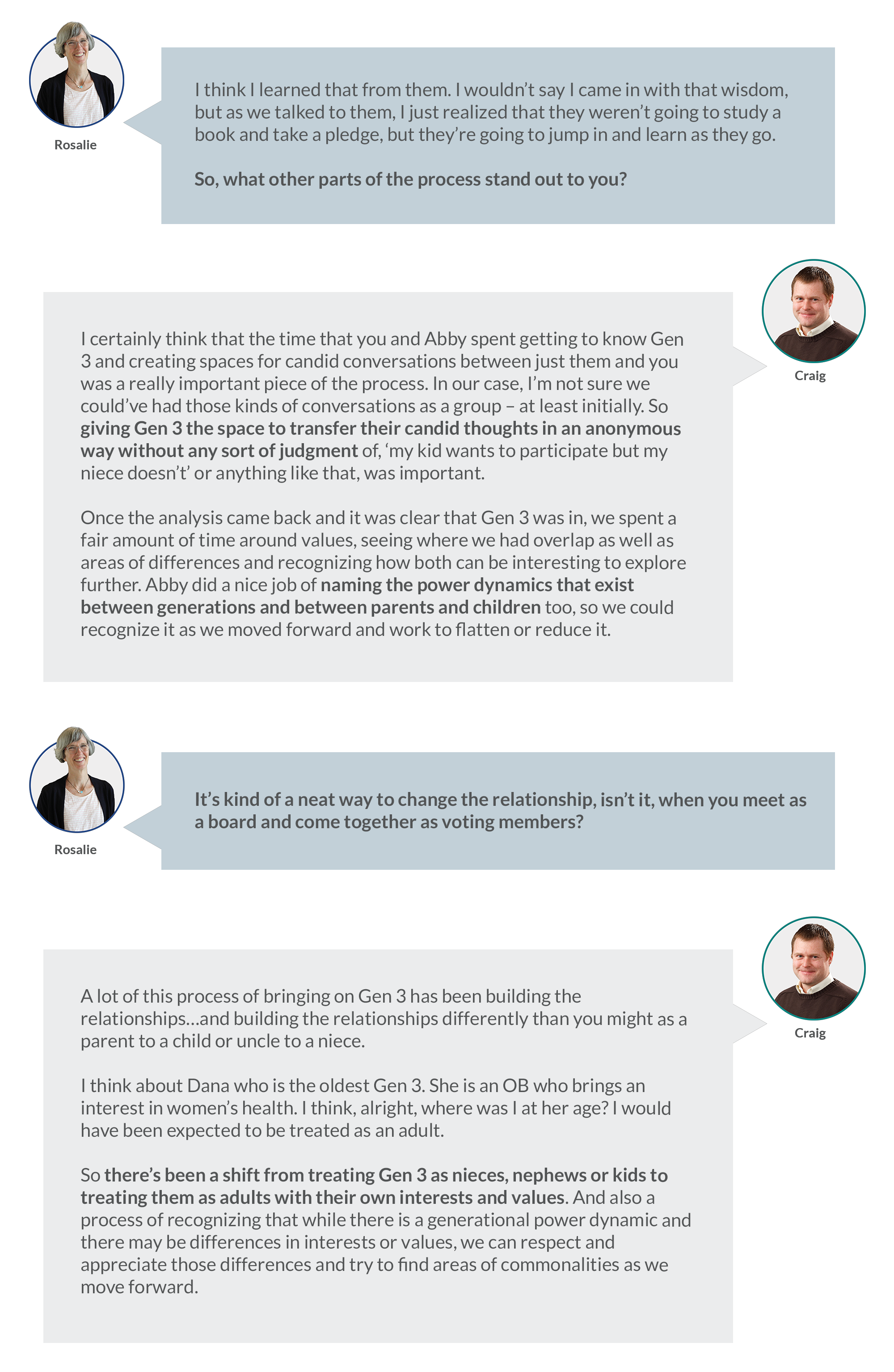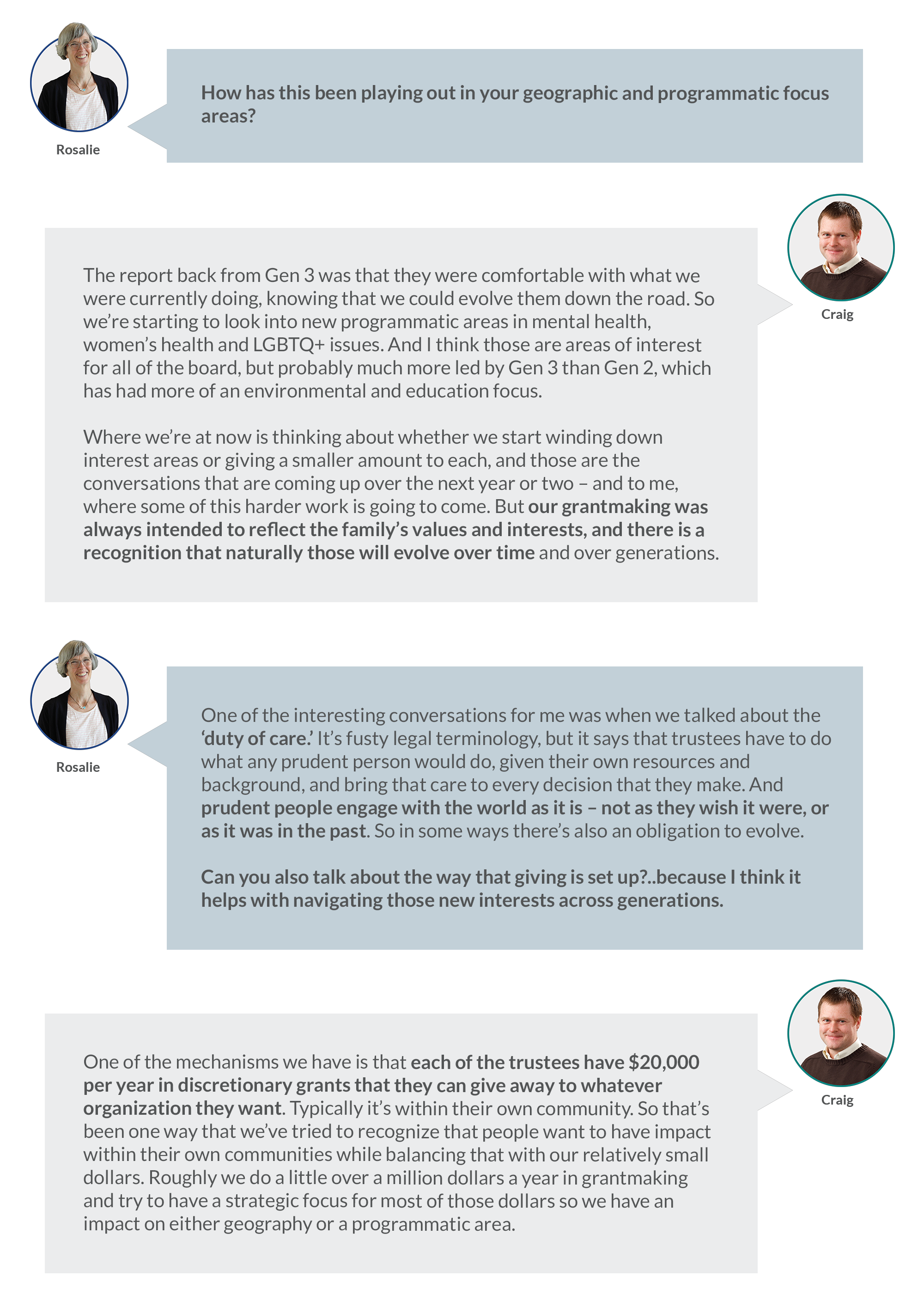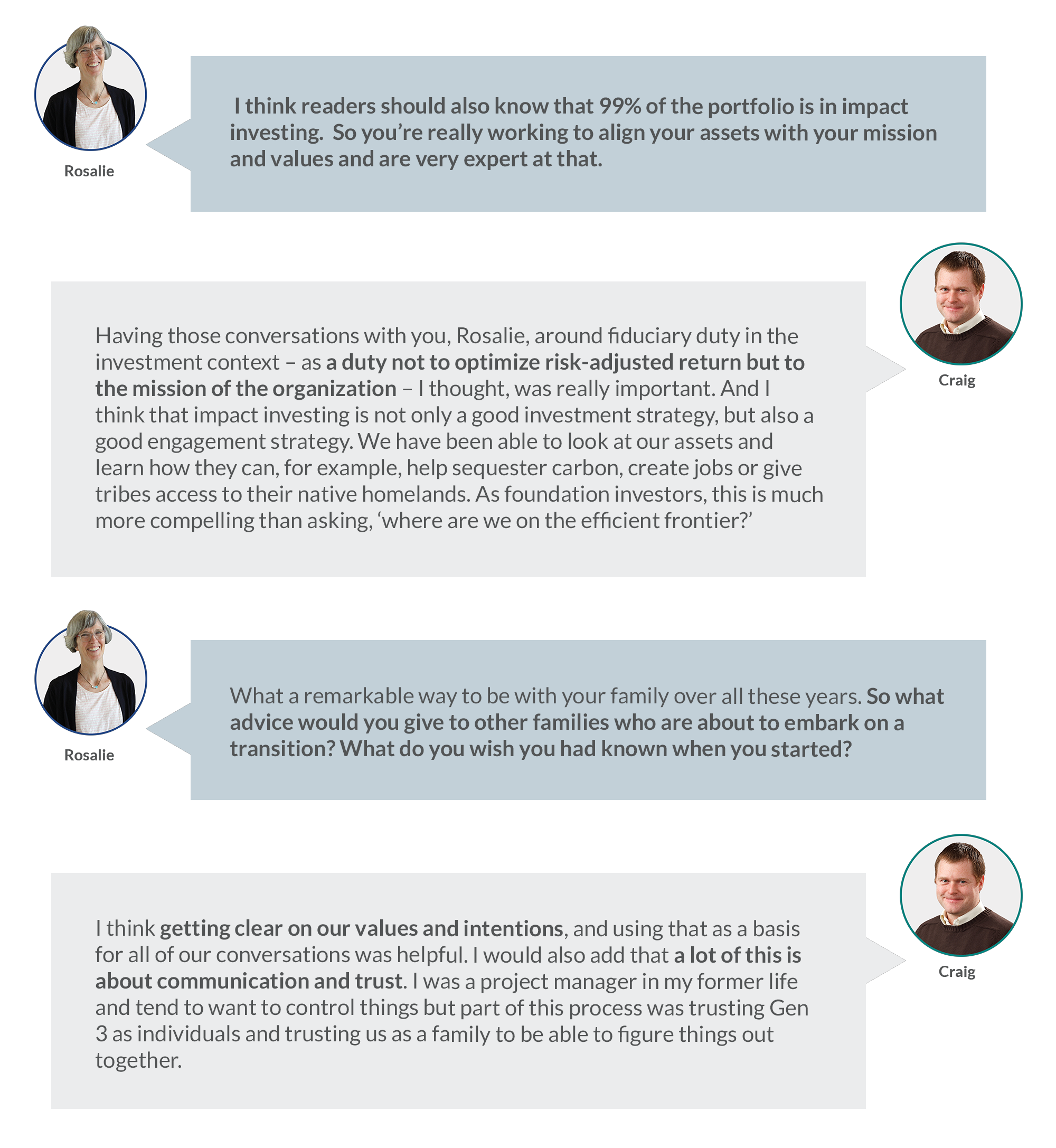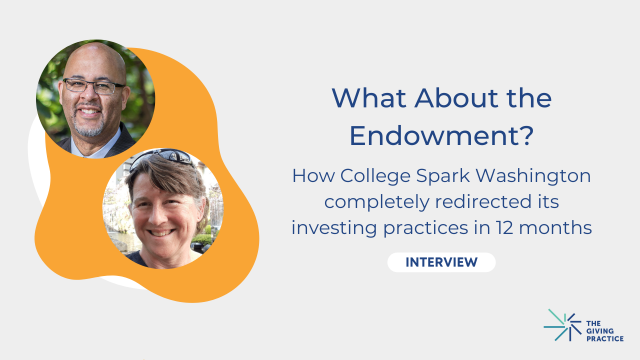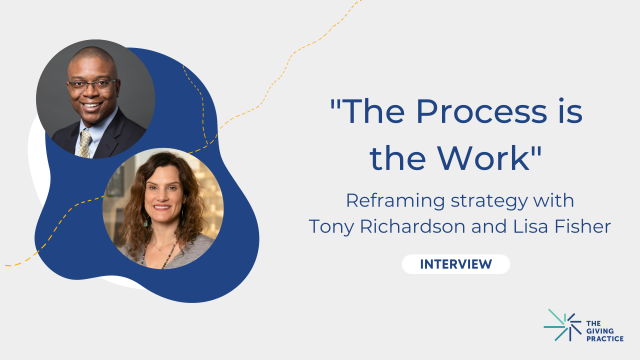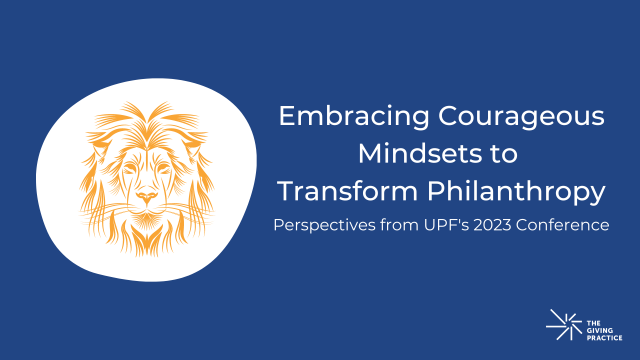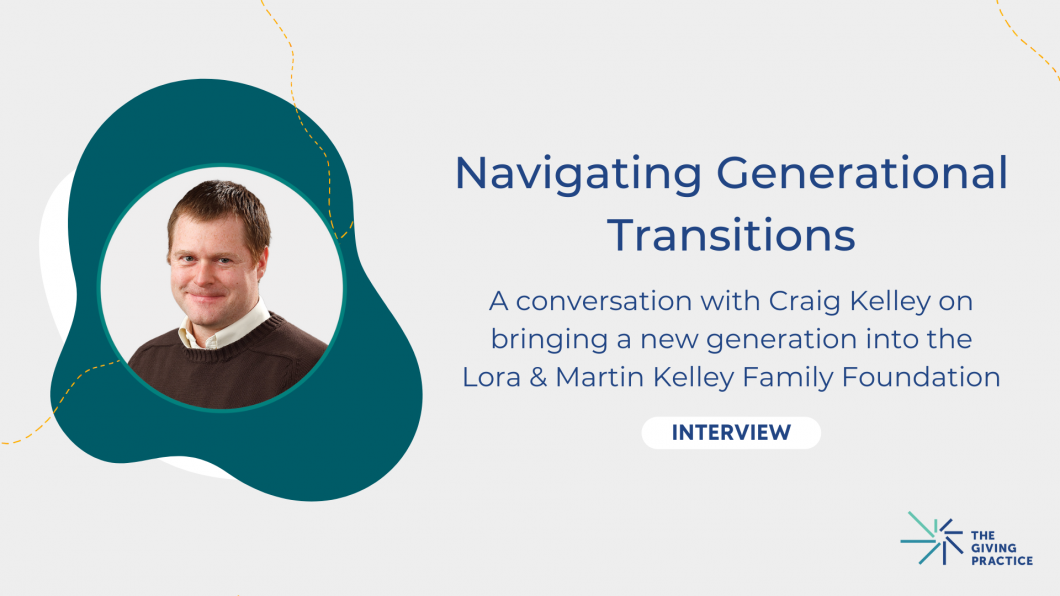
Bringing younger generations into the governance of family foundations is exciting and a bit complicated. When the governing generation “hands over the keys,” it often prompts families to reconsider the impact and legacy of their wealth.
For the Kelleys, it was also an opportunity for the all-family board to make new working relationships across generations and take an intentional approach as they charted the future of their foundation.
“It’s humbling for me to put the dots together, but I technically report to my daughter now,” Craig Kelley, managing trustee of the Lora & Martin Kelley Family Foundation, said with a smile.
The foundation was established in 1990 by Craig’s parents Lora and Martin. “My father worked at Kiewit, a mega infrastructure construction company, based in Omaha, NE that is one of the largest employee-owned companies in the United States. He was there for 40 plus years and when he retired he sold his interest in the company and set up the foundation,” Craig shared.
The foundation trust has a unique sunset provision that the board must affirmatively extend to stay in operation. “Initially the sunset was 2015, and we [Gen 2] extended it out to 2030. So in 2020, we began our conversations to determine whether we were going to extend again, and really, whether Gen 3 would step into leadership as Gen 2 was getting older. Interwoven with that was a look at our geographic and programmatic focus areas.” Craig explained.
Gen 2 Kelleys were also very clear that Lora and Martin envisioned the foundation as a common project that brought the family together, and they wanted to confirm this value for Gen 3.
TGP Senior Advisors Rosalie Sheehy Cates and Abby Sarmac had the privilege of supporting the Kelley family as they navigated this process.
“Normally I run the meetings, so having consultants come in and facilitate allowed me to be a full participant which was really important.” Craig shared. He also reflected on how important it was to have both Rosalie and Abby – two consultants of different ages, races and lived experiences – in the mix to support the family’s bi-racial, cross-generational group.
- Rosalie and Abby first facilitated a process to understand Gen 3’s interests in continuing the foundation. This included confidential interviews and surveys, and several Gen 3-only meetings.
- Ultimately, four forwarded their names to be board members, with the door open for any Gen 3 member to be involved over time. Once their interest was confirmed Abby and Rosalie supported the onboarding and integration process, facilitating conversations on family interests and values, and working to revise governing policies and processes as needed.
Below Rosalie and Craig sit down to give us a deeper look at the work.
You can find the below interview in plain text form at the bottom of the page.
You can learn more about the Lora & Martin Kelley Family Foundation here.
If you are interested in learning more about how TGP can support your family foundation, please reach out to us at hello@thegivingpractice.org.
Rosalie Sheehy Cates and Abby Sarmac are Senior Advisors at TGP. You can learn more about our team here.
Plain text interview:
Rosalie: I feel like the Kelley Family Foundation had such a pragmatic, respectful and flexible attitude towards the incoming generation. You had us interview them separately. We polled them anonymously. We gave them their own confidential meetings where they could talk about the foundation without the presence of the generation in charge. What were some of the attitudes or philosophies behind this?
Craig: I think a lot of it is about how we were raised and the approach that my parents took with us at the foundation. I was 19 when the foundation started, and initially we were funding things like the church, the opera and Oregon State University, which is my parents’ alma mater. The first grant that I wanted to do at 20 or 21 was to the Nature Conservancy and my father, as a mega-infrastructure-construction person, didn’t have a terribly high opinion of environmental organizations. But he came along and said, ‘this is something that is important to you, so we’ll go ahead and make this grant.’
He and my mother presented our family’s wealth and privilege not as a birthright or burden but as an opportunity – to create change in our community and to come together to discuss issues that were important to us, as individuals and as a family, and I wanted to make sure that Gen 3 had the same opportunity.
So as we [Gen 2] were talking about the sunset, I very much felt it wasn’t really our decision.
Rosalie: Let’s talk about some of Gen 3’s considerations or concerns as you first began these conversations. What came up?
Craig: Time is by far the scarcest resource. Gen 3 are in school or early in their careers. One has kids, others are probably going to have kids soon, so trying to juggle all of that and be expected to travel and figure out childcare and all was a huge barrier. Being able to meet virtually for almost all of the meetings was certainly a huge help.
Our [existing] Board Member Agreement laid out expectations around attending board meetings, being involved with committees, and doing trainings and all that. Gen 3 wouldn't necessarily say this directly, but I think the document landed as sort of patriarchal or patronizing, and you helped elevate that this is really on-the-job learning rather than something where you need to have certain credentials before you can join.
Rosalie: I think I learned that from them. I wouldn’t say I came in with that wisdom, but as we talked to them, I just realized that they weren’t going to study a book and take a pledge, but they’re going to jump in and learn as they go.
So, what other parts of the process stand out to you?
Craig: I certainly think that the time that you and Abby spent getting to know Gen 3 and creating spaces for candid conversations between just them and you was a really important piece of the process. In our case, I’m not sure we could’ve had those kinds of conversations as a group – at least initially. So giving Gen 3 the space to transfer their candid thoughts in an anonymous way without any sort of judgment of, ‘my kid wants to participate but my niece doesn’t’ or anything like that, was important.
Once the analysis came back and it was clear that Gen 3 was in, we spent a fair amount of time around values, seeing where we had overlap as well as areas of differences and recognizing how both can be interesting to explore further. Abby did a nice job of naming the power dynamics that exist between generations and between parents and children too, so we could recognize it as we moved forward and work to flatten or reduce it.
Rosalie: It’s kind of a neat way to change the relationship, isn’t it, when you meet as a board and come together as voting members?
Craig: A lot of this process of bringing on Gen 3 has been building the relationships…and building the relationships differently than you might as a parent to a child or uncle to a niece. I think about Dana who is the oldest Gen 3. She is an OB who brings an interest in women’s health. I think, alright, where was I at her age? I would have been expected to be treated as an adult. So there’s been a shift from treating Gen 3 as nieces, nephews or kids to treating them as adults with their own interests and values. And also a process of recognizing that while there is a generational power dynamic and there may be differences in interests or values, we can respect and appreciate those differences and try to find areas of commonalities as we move forward.
Rosalie: How has this been playing out in your geographic and programmatic focus areas?
Craig: The report back from Gen 3 was that they were comfortable with what we were currently doing, knowing that we could evolve them down the road. So we’re starting to look into new programmatic areas in mental health, women’s health and LGBTQ+ issues. And I think those are areas of interest for all of the board, but probably much more led by Gen 3 than Gen 2, which has had more of an environmental and education focus.
Where we’re at now is thinking about whether we start winding down interest areas or giving a smaller amount to each, and those are the conversations that are coming up over the next year or two – and to me, where some of this harder work is going to come. But our grantmaking was always intended to reflect the family’s values and interests, and there is a recognition that naturally those will evolve over time and over generations.
Rosalie: One of the interesting conversations for me was when we talked about the ‘duty of care. It’s fusty legal terminology, but it says that trustees have to do what any prudent person would do, given their own resources and background, and bring that care to every decision that they make. And prudent people engage with the world as it is – not as they wish it were, or as it was in the past. So in some ways there’s also an obligation to evolve.
Can you also talk about the way that giving is set up?..because I think it helps with navigating those new interests across generations.
Craig: One of the mechanisms we have is that each of the trustees have $20,000 per year in discretionary grants that they can give away to whatever organization they want. Typically it’s within their own community. So that’s been one way that we’ve tried to recognize that people want to have impact within their own communities while balancing that with our relatively small dollars. Roughly we do a little over a million dollars a year in grantmaking and try to have a strategic focus for most of those dollars so we have an impact on either geography or a programmatic area.
Rosalie: I think readers should also know that 99% of the portfolio is in impact investing. So you’re really working to align your assets with your mission and values and are very expert at that.
Craig: Having those conversations with you, Rosalie, around fiduciary duty in the investment context – as a duty not to optimize risk-adjusted return but to the mission of the organization – I thought, was really important. And I think that impact investing is not only a good investment strategy, but also a good engagement strategy. We have been able to look at our assets and learn how they can, for example, help sequester carbon, create jobs or give tribes access to their native homelands. As foundation investors, this is much more compelling than asking, ‘where are we on the efficient frontier?’
Rosalie: What a remarkable way to be with your family over all these years. So what advice would you give to other families who are about to embark on a transition? What do you wish you had known when you started?
Craig: I think getting clear on our values and intentions, and using that as a basis for all of our conversations was helpful. I would also add that a lot of this is about communication and trust. I was a project manager in my former life and tend to want to control things but part of this process was trusting Gen 3 as individuals and trusting us as a family to be able to figure things out together.
Subscribe to our quarterly newsletter to stay up to date on our latest reflections, insights, interviews and more.

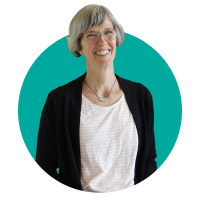
![Rosalie: I feel like the Kelley Family Foundation had such a pragmatic, respectful and flexible attitude towards the incoming generation. You had us interview them separately. We polled them anonymously. We gave them their own confidential meetings where they could talk about the foundation without the presence of the generation in charge. What were some of the attitudes or philosophies behind this? Craig: I think a lot of it is about how we were raised and the approach that my parents took with us at the foundation. I was 19 when the foundation started, and initially we were funding things like the church, the opera and Oregon State University, which is my parents’ alma mater. The first grant that I wanted to do at 20 or 21 was to the Nature Conservancy and my father, as a mega-infrastructure-construction person, didn’t have a terribly high opinion of environmental organizations. But he came along and said, ‘this is something that is important to you, so we’ll go ahead and make this grant.’ He and my mother presented our family’s wealth and privilege not as a birthright or burden but as an opportunity – to create change in our community and to come together to discuss issues that were important to us, as individuals and as a family, and I wanted to make sure that Gen 3 had the same opportunity. So as we [Gen 2] were talking about the sunset, I very much felt it wasn’t really our decision. Rosalie: Let’s talk about some of Gen 3’s considerations or concerns as you first began these conversations. What came up? Craig: Time is by far the scarcest resource. Gen 3 are in school or early in their careers. One has kids, others are probably going to have kids soon, so trying to juggle all of that and be expected to travel and figure out childcare and all was a huge barrier. Being able to meet virtually for almost all of the meetings was certainly a huge help. Our [existing] Board Member Agreement laid out expectations around attending board meetings, being involved with committees, and doing trainings and all that. Gen 3 wouldn't necessarily say this directly, but I think the document landed as sort of patriarchal or patronizing, and you helped elevate that this is really on-the-job learning rather than something where you need to have certain credentials before you can join.](https://philanthropynw.org/sites/default/files/Kelley%20Family%20Foundation_Q1Q2_2.png)
